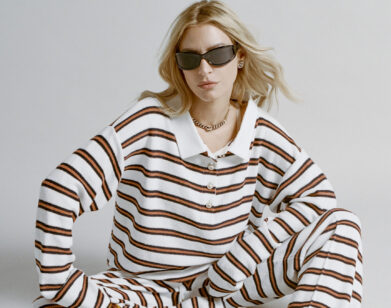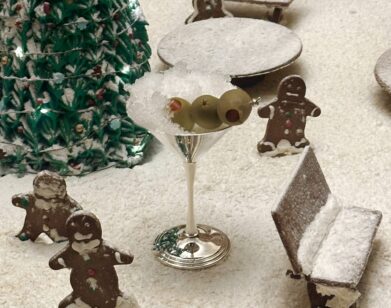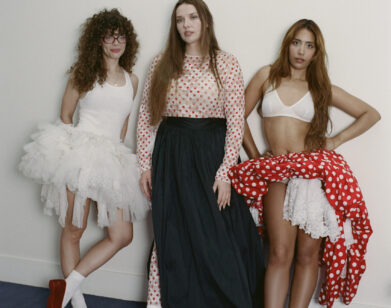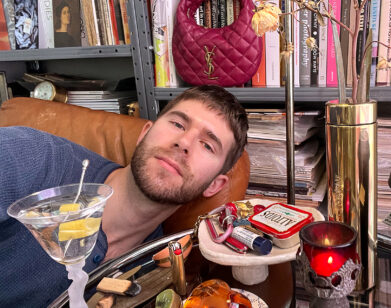Vivienne Westwood Is Fashion’s Global Punk Warrior
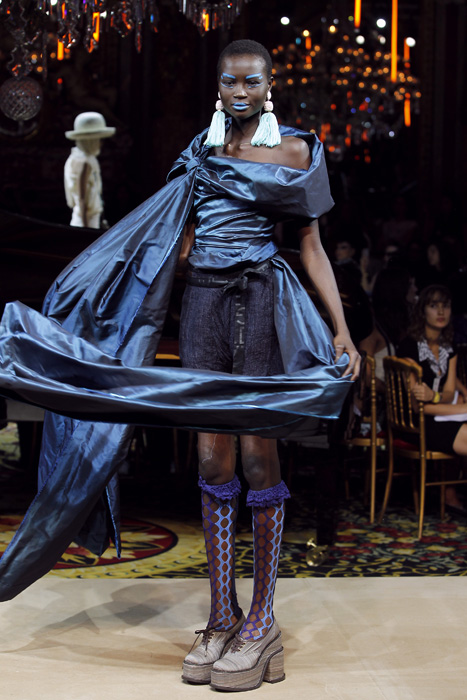
“War” and “Peace” were etched onto the invitation for Dame Vivienne Westwood’s 30th anniversary show, which debuted last Friday in the chandelier-garnished ballroom of Paris’s Grand Hotel Intercontinental. But they were appropriately weighty concepts to mark the designer’s three decades on the runway. London’s First Lady of Punk, who currently has a look on display in the Victoria and Albert Museum’s Postmodernism exhibition, pulled inspiration from the disintegrating state of the desert, 17th-century corsets, and her hope that China’s traditional wisdom will help us save the planet. Not your typical references, but what else would we expect from fashion’s favorite rebel—a crusader for the environment and human rights who essentially created punk style with her 1981 “Pirate” collection, a collaboration with then-partner Malcolm McLaren.
Westwood’s lofty inspirations resulted in a Spring collection that merged historical references and ethnic attire. To the music of 16-year-old pianist Kyle Nash Baker, a model in frayed black and blue knit dress, her face painted-up like a vamp-geisha, took to the runway. Next came romantic draped frocks and tops influenced by paintings of women wrapped in bed sheets from the time of Charles II. Immaculate 17th-century corsets were oversized and deconstructed, and Westwood’s new obsession with China manifested itself in floral, Oriental embroidery, as well as a print that incorporated the words “Green Economy,” written in Chinese. The palette, rich blue, dusty pink, taupe, black and gold, clearly stemmed from the designer’s desert influence, and cartoonish oversized hats and platform shoes, some of which were stamped to look like crocodile, were over-the-top creations that could only have come from Westwood’s ever-wild imagination. Closing the show three tear-inducing lace gowns, the fiery-haired Dame herself walked on to the runway to take her bow. And after three decades of drama and rebellion, it was a much-deserved one. Here, interview talks to the designer about her 30th anniversary, the new collection, and how she’s tried to change the world through fashion.
KATHARINE ZARRELLA: Does fashion mean the same thing to you as it did 30 years ago when you were really revolutionary?
VIVIENNE WESTWOOD: It’s kind of easier than it was. But in a way it’s harder, because you keep doing shows and we keep doing things and you think, “Oh my god do we have to go through all this again?” But nevertheless, now, I’m extremely happy. I’m pleased to be doing this show. And it’s absolutely great, when everything comes together with the hair, the dresses and the makeup and the models and the music and the presentation. I can’t get over these girls. They look wonderful. But by the time we finish with them, they look like they came from another planet. And I just think it’s great.
ZARRELLA: But does fashion mean the same thing to you?
WESTWOOD: Well, I’m very much a literary person. And my fashion always tells a story somehow. I never look at fashion magazines. I find them incredibly boring. To me, reading a fashion magazine is the last thing I need to do. I’ve got books I need to read. More people should read books. It’s the most concentrated experience you can have. You know, all those incredible geniuses concentrated their lifetimes’ experiences in books. It’s much better than chattering away to somebody who’s never read anything and knows nothing at all.
ZARRELLA: Where does your desire to change the world environmentally and culturally come from? And can we change the world through fashion?
WESTWOOD: Well I’ve always put myself in the place of people who suffer. I used to always fight for human rights. I still fight for Leonard Peltier, who’s spent 35 years in jail for a crime he didn’t commit. And they’re persecuting and torturing him still. I don’t know how that man manages what he has to put up with. But I always feel that criminality is usually to be in the wrong place at the wrong time. And it’s like, I could be there as well. Now then with the climate problem, of course I hate the idea of them chopping the rainforest down. I hate the idea of all the animals dying, but even more I’m really terrified of what is going to happen to human beings in one generation. Most of our planet will be uninhabitable unless we work now, so I’ve been using my fashion shows to talk about this. And now I’ve found a way to be very very active about it. Because there are so many charities that you can lock into that are already doing so much. We’re working on it. I just used my opportunity and my credibility to help. But also, I use fashion as a medium. I put things in the show that send a message.
ZARRELLA: How does this collection punctuate your 30-year career?
WESTWOOD: Well, it’s inspired by all my experience at the moment. I’m very concerned about climate change, therefore it’s got quite a lot to do with the desert. It’s inspired by how beautiful it can be anyway, even though it’s a disaster, all the changes in the desert. So that’s part of it. And China, I hope that China can help save the planet. I think they’re on the point of changing from making it worse to making it better… I hope.
ZARRELLA: How important is music in your collections?
WESTWOOD: Not terribly. I’m not at all interested in popular music. I don’t think anything’s happening. Maybe some things are. Let’s hope they are. I go to a lot of classical music concerts but I don’t like everybody. For this show, I have this kid, Kyle Nash Baker, who taught himself to play the piano by looking at films on YouTube. He’s composed all this stuff with some sound effects.
ZARRELLA: Why have you done this for 30 years and how much longer do you plan to keep designing?
WESTWOOD: Well, I’m happy at the moment because all my priorities about culture and about saving the world from disaster, I feel that fashion and that is all coming together and we’re helping each other. So I’m incredibly glad to have this opportunity. And I’m really glad for all the support I get.
ZARRELLA: What does it mean to be both a dame and a punk?
WESTWOOD: I don’t know. I will be both until I die.

